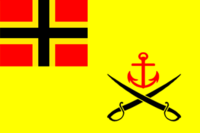Rickerman-Insel

| |
| Area: | 3 sq. mi. |
| Population: | 50 Rickermänner |
| Established: | 2003, Mejican-German treaty |
| Language: | German, Riksmål, Nahuatl |
| Emperor: | Holy Roman Empress Maria |
| Kommissar: | Walter Steinmeier |
| Currency: | Oldenburger Neuegroschen |
| Subdivision of: | Holy Roman Empire |
Rickerman-Insel (Rickerman Island) is the first-ever overseas colony of the Holy Roman Empire. Named for 18th-century English pirate "Thunderin'" John Rickerman, who used it as a base, the island is located in the Pacific Ocean, just over 600 miles southwest of Acapulco, Mejico.
History
Over the course of the nineteenth and twentieth centuries, the island was successively ruled by Russia, Japan, and Mejico. Japan relinquished the island c. 1920 when guano deposits there proved unprofitable. Mejico never developed the island, and by the late XXth century it had become a burden to the republic, responsible for patrolling the uninhabited atoll.
As the Verein für Raumschiffahrt (VfR - "Spaceflight Society") secretly worked on the world's first artificial satellite, it was in need of a global network of satellite tracking stations. A number of deals of varying degrees of legality were struck with nations that allowed the VfR to build facilities to track a satellite in orbit. The VfR had a launch site in Crimea and a(n undisclosed) deal with the Russians; to this day, no one's been able to figure it out. Rickerman, however, was the only such deal that eventually resulted in actual transfer of territory.
In 1999 the VfR approached Mejico for permission to build a tracking station on the island. Mejico responded with a surprising offer: outright sale of the island itself to the aerospace company. Mejico got some much-needed cash, and the VfR got some land to develop as it wished. The deal was made, and VfR workers arrived via amphibious airship to build the facility.
Rickerman occupied a key place in the primitive satellite tracking network, located approximately 2/3 of the distance around the earth from the rocket launch site in Crimea. The VfR had another facility in the deserts of Tejas, not terribly far away, but Rickerman was considered a more important asset since the VfR actually owned the land.
After Germany successfully launched a satellite in 2002, the VfR managed to negotiate a deal in which Mejico transfered sovereignty of the island to Germany in return for a very modest fee.
Rickerman today
The Rickerman facility is the only remaining part of the ad hoc tracking network put together in 1999-2002. (Some Russian stations undoubtedly still exist, but their existence has been repeatedly denied.) When the Scandinavian Realm joined Germany's space program to form the Tysk-Skandinaviske Rum Compagnie, new tracking stations were built on Scandinavian territory around the globe. Rickerman, being on German soil, was kept and improved with the help of Realm dalers.
Today the island is a possession of the German Diet as a whole, in theory a sort of condominium among the different states. Actually, however, it is wholly administered by the Company, which has the island on "permanent lease" from the Diet. The island's Commissioner, technically a representative of the Diet, is actually a TSRC employee in charge of the tracking station. The current Commissioner is Walter Steinmeier, a career lawyer and diplomat from the Principality of Lippe.
Rickerman-Insel is home to around 50 technicians and support staff, who generally hold it to be the most miserable assignment in the aerospace industry. Many of the workers come from the German-Scandinavian border states of Oldenburg, Schleswig-Holstein, and Lybeck. Others come from Scandinavia proper, elsewhere in northern Germany, and Mejico. Most supplies are shipped from Acapulco in Scandinavian vessels and airships. Workers on Rickerman are paid in Oldenburger Neuegroschen, which are compatable with both Scandinavian and German currencies.
Germans have come to feel proud of their tiny colony. Together with Germany's presence in space, the label on world maps reading "Rickerman-I. (HRR)![]() " is to many Germans a sign that despite their national emasculation following GW2, they will not be a hamstrung and downtrodden hasbeen power forever.
" is to many Germans a sign that despite their national emasculation following GW2, they will not be a hamstrung and downtrodden hasbeen power forever.
Some entrepreneurs from Hamburg have recently come to the TSRC with an offer to develop the island for tourism.
(BK)
| |||
|---|---|---|---|
| Member Entities | |||
| Anhalt | Baden | Bavaria | Bremen | Brunswick | Hamborg | Hannover | Hesse | Lippe | Luebeck | Luxemburg | Mecklenburg | Oldenburg | Premaria | Prussia | Rhineland-Palatinate | Saarland | Saxony | Schleswig-Holstein | Thuringia | Waldeck-Pyrmont | Westphalia | Wuerttemberg | |||
| Colony: Rickerman-Insel |